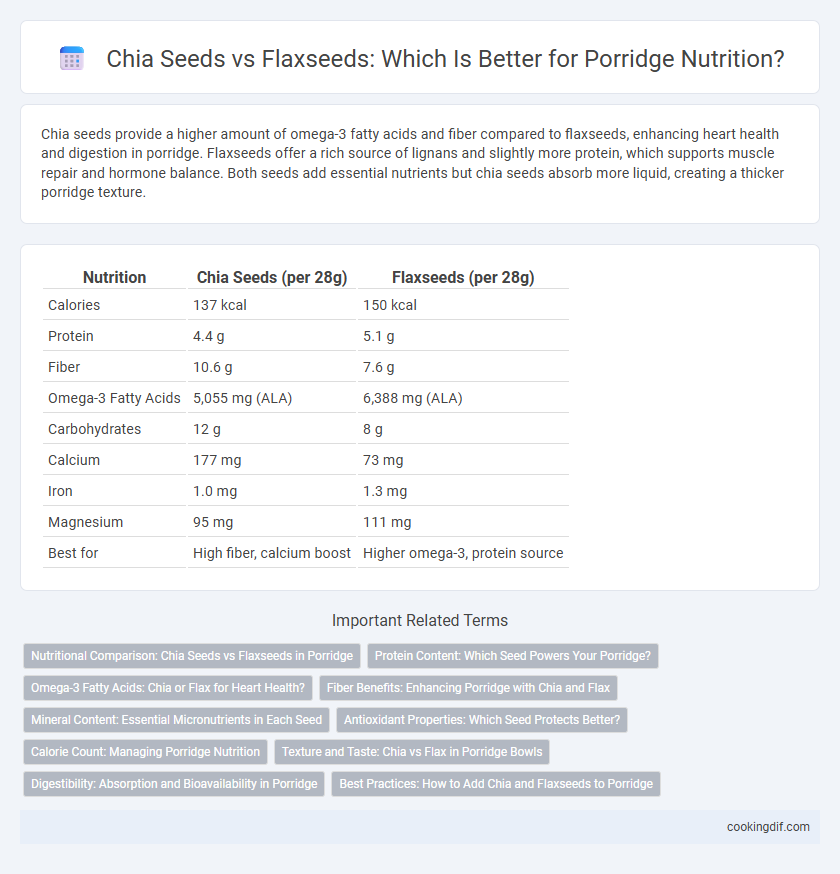Chia seeds provide a higher amount of omega-3 fatty acids and fiber compared to flaxseeds, enhancing heart health and digestion in porridge. Flaxseeds offer a rich source of lignans and slightly more protein, which supports muscle repair and hormone balance. Both seeds add essential nutrients but chia seeds absorb more liquid, creating a thicker porridge texture.
Table of Comparison
| Nutrition | Chia Seeds (per 28g) | Flaxseeds (per 28g) |
|---|---|---|
| Calories | 137 kcal | 150 kcal |
| Protein | 4.4 g | 5.1 g |
| Fiber | 10.6 g | 7.6 g |
| Omega-3 Fatty Acids | 5,055 mg (ALA) | 6,388 mg (ALA) |
| Carbohydrates | 12 g | 8 g |
| Calcium | 177 mg | 73 mg |
| Iron | 1.0 mg | 1.3 mg |
| Magnesium | 95 mg | 111 mg |
| Best for | High fiber, calcium boost | Higher omega-3, protein source |
Nutritional Comparison: Chia Seeds vs Flaxseeds in Porridge
Chia seeds contain higher levels of omega-3 fatty acids and fiber, enhancing heart health and digestion in porridge. Flaxseeds provide more lignans and a richer source of protein, supporting hormonal balance and muscle repair. Both seeds offer essential vitamins and minerals, but chia seeds absorb more liquid, creating a creamier texture in porridge compared to flaxseeds.
Protein Content: Which Seed Powers Your Porridge?
Chia seeds provide approximately 4.7 grams of protein per 28 grams, making them a robust choice for boosting porridge protein. Flaxseeds offer around 5.2 grams of protein per 28 grams, slightly edging out chia seeds in protein content. Both seeds enrich porridge with essential amino acids, but flaxseeds deliver a marginally higher protein punch to power your breakfast.
Omega-3 Fatty Acids: Chia or Flax for Heart Health?
Chia seeds contain higher levels of alpha-linolenic acid (ALA), a plant-based Omega-3 fatty acid known to support heart health by reducing inflammation and lowering cholesterol. Flaxseeds, while also rich in ALA, provide lignans and fiber that complement cardiovascular benefits, but their Omega-3 content is slightly less concentrated than chia seeds. Choosing chia seeds for porridge enhances Omega-3 intake more effectively, promoting improved heart health and anti-inflammatory effects.
Fiber Benefits: Enhancing Porridge with Chia and Flax
Chia seeds provide a higher soluble fiber content compared to flaxseeds, promoting better digestion and prolonged satiety when added to porridge. Flaxseeds offer both soluble and insoluble fiber, supporting bowel regularity and gut health with their lignan content enhancing antioxidant properties. Combining chia and flaxseeds in porridge maximizes fiber diversity, improving overall digestive health and nutrient absorption.
Mineral Content: Essential Micronutrients in Each Seed
Chia seeds contain higher levels of calcium, magnesium, and phosphorus essential for bone health, while flaxseeds provide more manganese and selenium, which support antioxidant functions and metabolism. Both seeds supply iron and zinc, but chia seeds offer slightly more iron, enhancing oxygen transport and immune function. Choosing between chia and flaxseeds for porridge mineral content depends on targeted micronutrient benefits such as calcium for bones or selenium for oxidative stress reduction.
Antioxidant Properties: Which Seed Protects Better?
Chia seeds contain high levels of antioxidants such as chlorogenic acid, caffeic acid, and quercetin, which help neutralize free radicals and reduce oxidative stress more effectively in porridge. Flaxseeds also provide antioxidant lignans, particularly secoisolariciresinol diglucoside (SDG), contributing to their protective effects but generally at lower antioxidant potency compared to chia. Therefore, chia seeds offer superior antioxidant properties and better protection against cellular damage when incorporated into porridge.
Calorie Count: Managing Porridge Nutrition
Chia seeds contain approximately 138 calories per ounce, providing a nutrient-dense boost to porridge while aiding in calorie control due to their high fiber content. Flaxseeds have about 150 calories per ounce and offer a rich source of omega-3 fatty acids, which support heart health and satiety. For calorie-conscious porridge management, chia seeds may be preferred for their lower calorie load and hydrating properties that enhance fullness.
Texture and Taste: Chia vs Flax in Porridge Bowls
Chia seeds create a gel-like texture in porridge due to their high soluble fiber content, offering a smooth and slightly gelatinous mouthfeel, whereas flaxseeds contribute a grittier, nuttier texture because of their crushed seeds and oil content. The mild, neutral flavor of chia blends seamlessly into porridge without overpowering other ingredients, while flaxseeds provide a richer, earthier taste with subtle nutty undertones. Both superfoods enhance porridge nutrition, but texture and flavor preferences depend on whether a creamy or more textured bowl is desired.
Digestibility: Absorption and Bioavailability in Porridge
Chia seeds offer superior digestibility in porridge due to their mucilage content, which enhances nutrient absorption and promotes gradual glucose release. Flaxseeds require grinding to unlock their bioavailable omega-3 fatty acids and lignans; otherwise, they may pass through the digestive system undigested. Incorporating ground flaxseeds or whole chia seeds into porridge optimizes nutrient uptake and overall bioavailability for improved digestive benefits.
Best Practices: How to Add Chia and Flaxseeds to Porridge
To maximize nutritional benefits in porridge, soak chia seeds for at least 10-15 minutes before adding them, allowing them to form a gel that improves digestion and nutrient absorption. Ground flaxseeds are best stirred in after cooking to preserve their omega-3 fatty acids and prevent them from degrading under heat. For optimal fiber intake and texture, combine both seeds by soaking chia seeds separately and mixing ground flaxseeds into warm porridge just before serving.
Chia seeds vs Flaxseeds for porridge nutrition Infographic

 cookingdif.com
cookingdif.com